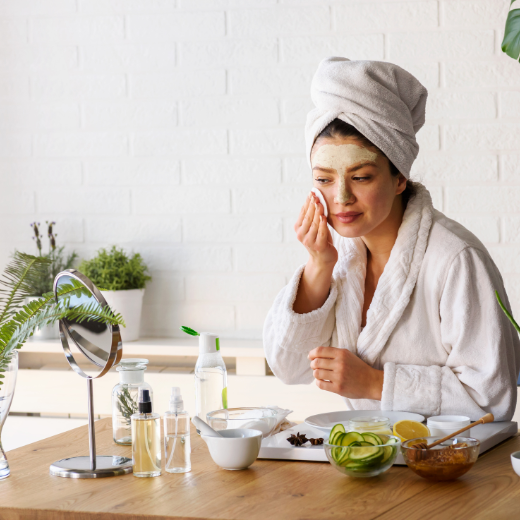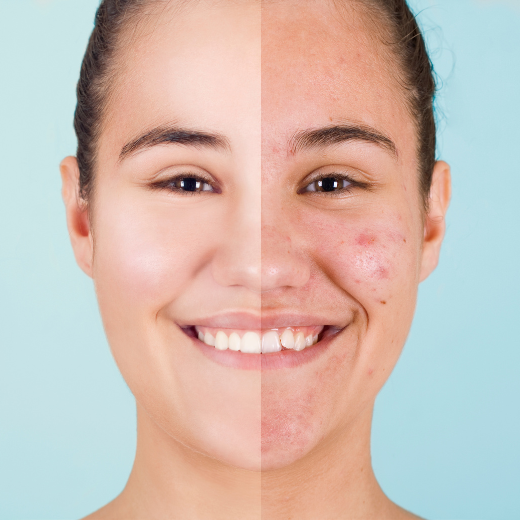How to Conquer the Battle Against Deep Cystic Acne
Posted by Ellie Swain on Mar 27th 2025
Deep cystic acne can feel like a heart-breaking, relentless battle that just won’t end. These painful, stubborn bumps beneath the skin seem to have a mind of their own, defying every attempt to banish them.
If you’ve been struggling with cystic acne, you're not alone, and there’s hope on the horizon. With the right approach and patience, you can manage and even clear up these unwanted breakouts. Let’s learn what cystic acne is, why it happens, and how you can take control of your skin.
What is Cystic Acne? And Why is it So Difficult?
Cystic acne is like the more aggressive, less friendly version of regular pimples. It forms deep within the skin, causing large, inflamed, and often painful cysts that persist for weeks or even months.
These cysts can leave behind scarring and discoloration, which only adds to the frustration. The key difference between cystic acne and other types of acne is that cysts form when bacteria, oil, and dead skin cells get trapped in your pores. This causes the pore to swell up, creating a cyst that feels like a painful lump under the skin.
The Importance of a Gentle Skincare Routine
When dealing with cystic acne, it’s tempting to throw every product on your bathroom shelf at it, hoping something will work. Unfortunately, this approach can often do more harm than good. Over-exfoliating, using harsh cleansers, or layering on too many active ingredients can irritate the skin, worsening your acne.
The secret to managing cystic acne is to keep things simple and gentle. Opt for a cleanser that’s effective at removing excess oil and impurities but won’t strip your skin of its natural moisture, like the soothing, aptly named Osmosis Gentle Cleanser.
Likewise, incorporating calming ingredients like niacinamide can help treat inflammation and support your skin’s barrier function. Containing niacinamide, the PCA Skin Rebalance is a nourishing, light moisturizer that hydrates, calms and soothes skin. And if you’re using any prescription treatments, make sure your skincare routine supports these products rather than counteracts their effects.

Navigating Hormonal Breakouts with Spironolactone
While this may or may not apply to you, hormones often play a big role in cystic acne. You may notice that your breakouts are worse during certain times of the month or appear out of nowhere during times of stress.
That’s because hormones can cause your oil glands to go into overdrive, producing excess oil that clogs pores. But even if your hormones are wreaking havoc, there are ways to calm the storm.
If your cystic acne is triggered by hormonal fluctuations, you’ve probably tried everything from topical treatments to dietary changes, only to find that nothing really works. Enter spironolactone for hormonal acne.
Originally developed as a diuretic for high blood pressure, spironolactone has an unexpected side hustle – blocking androgen receptors. Androgens are male hormones that, when produced in excess, can lead to increased oil production. By keeping these hormones in check, spironolactone helps reduce the severity and frequency of hormonal breakouts.
However, spironolactone isn’t for everyone. It’s typically prescribed to women with hormonal acne because it can disrupt testosterone production. While it's not an overnight miracle, many people start to see significant improvements after a few months of consistent use.
First, discuss your potential use of spironolactone with your dermatologist or doctor. They can determine whether the medication is right for you, decide on the best dosage for your situation, and monitor any side effects. Spironolactone can be transformative with time, giving you clearer skin and a boost of confidence.
Accutane: The Big Guns for Severe Acne
For those who have tried everything else without success, Accutane (also known as isotretinoin) might be the next step. This powerful medication is like the superhero of acne treatments, swooping in to tackle the most severe cases.
Accutane works by reducing the size of the oil glands in your skin, which means less oil production and a lower chance of clogged pores. While it can be incredibly effective, Accutane isn’t a decision to be taken lightly.
It sometimes comes with a range of side effects, from dry skin and chapped lips to more serious concerns like mood changes and liver function issues. Accutane is typically reserved for people with severe cystic acne that hasn’t responded to other treatments.
If you’re considering Accutane, make sure to have a thorough discussion with your dermatologist about the risks and benefits. Proper monitoring and care can provide dramatic, long-lasting results, transforming even the most stubborn acne-prone skin.
Practice Patience and Persistence
It’s easy to feel disheartened when dealing with cystic acne, especially when it feels like nothing is working. But remember that treating deep cystic acne takes time, and the path to clearer skin isn’t always linear. There may be setbacks and moments of frustration, but persistence is key.
Beyond topical treatments and prescriptions, lifestyle factors can also play a role. Stress, diet, and sleep quality can all impact your skin’s health.
While it’s impossible to control everything, finding ways to manage stress and support your overall well-being can make a noticeable difference in your skin’s appearance. Small changes, like drinking more water, eating anti-inflammatory foods, and practicing relaxation techniques like meditation, can support your skin’s healing process from the inside out.
Everyone’s skin is unique, and what works for one person might not work for another. Don’t be afraid to seek professional help from a dermatologist, who can provide personalized advice and treatment options.
Remember, you’re not alone in this journey, and clearer skin is within reach. Keep your chin up, be gentle with yourself, and celebrate the progress you make, no matter how small.
Do you want more skincare advice? Here’s why 'prejuvenation' is the new anti-aging trend.


